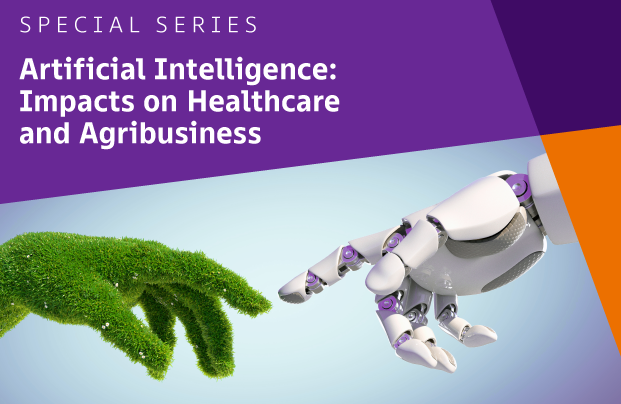

Artificial intelligence in the Brazilian agribusiness sector
The use of AI in agribusiness is on the rise in Brazil and creating new opportunities
Subjects
In this article – the third in our special “Artificial Intelligence: Impacts on Healthcare and Agribusiness” series, we turn our attention to developments in the use of AI within Brazil’s agribusiness sector. Our first article explored how AI is being applied in medical devices and software, while the second delved into the use of AI in healthcare services and discussed the Brazilian Supplementary Health Agency’s (ANS) efforts to spearhead a digital transformation.
Agribusiness is a cornerstone of the Brazilian economy. Increased efficiency and quality within the sector’s extensive production and distribution chains serve to influence Brazil’s key economic indicators, boost growth for the companies involved, and also lead to swift, practical changes in the lives of the public that depends on agribusiness. Moreover, such improvements can result in more sustainable solutions for our planet.
It should be little surprise then that this sector is highly receptive to new technology. While the use of technology in the agribusiness sector is hardly a new concept – GPS systems have been used for decades to enhance traditional navigation methods, measure areas, determine coordinates, and store data – ongoing advancements in agricultural technology, data processing, sensors, agricultural software, drones, and agricultural vehicles have been yielding notable benefits. Leading to improved soil analysis, production control, field monitoring, safety, and crop management and planning.
A growing industry
According to research from Brazil’s Micro and Small Business Support Service (Sebrae), between 2020 and 2026, the use of AI in agriculture is projected to rise by 25.5%. This growth is fueled by the increasing use of data, sensors, and aerial crop imaging, all of which can be fed into machine learning technologies to enhance productivity.
Brazil’s Ministry of Agriculture (Mapa) has recognized AI’s potential to streamline services and keep the local agribusiness sector globally competitive. In February 2024, it was involved in a selection process concerning AI solutions for the public sector, organized by the Ministry of Science, Technology, and Innovation.
This process is designed to promote the use of AI in solutions the federal government adopts. The projects the Ministry of Agriculture presented aim to facilitate access to agricultural information using neural language (similar to generative AI tools available on the market) and provide greater accuracy in documentary analyses and inspection processes.
As a result of the selection process, Mapa is expected to receive support and financial backing to develop the proposed technologies.
AI applications in agribusiness
For the agribusiness sector, the use of AI systems to collect and process large volumes of information, analyze data, support decision-making, and automate processes offers numerous benefits. The primary applications of artificial intelligence include:
- GPS: As one of the original applications in agribusiness, GPS is commonly used to demarcate areas to optimize land management and maximize efficiency in agriculture;
- Smart sensors: Sensors can be used to monitor soil moisture, temperature, humidity, air quality, weather forecasts, and various other factors. When integrated with AI, these sensors enable accurate weather forecasts and highly detailed measurements. This information is crucial for agricultural producers to make informed and strategic decisions;
- Agricultural software: Agricultural software is important for real-time information analysis, providing producers with detailed reports and enabling more efficient resource management. When powered by AI, this software can learn from collected data to improve producers’ decision-making abilities and enhance precision;
- Field cameras and drones: These tools are becoming increasingly common in Brazil, where they assist in demarcating areas, generating accurate maps, crop spraying, and the early detection of pests and diseases (facilitating quicker and more effective responses to protect crops). They can also be used to monitor livestock and herd behavior, count animals, and identify injured or lost animals in agricultural areas;
- Autonomous agricultural vehicles (AAVs): AAVs are increasingly used for tasks such as planting, harvesting, and crop spraying, thus boosting automation and increasing operational efficiency. In this scenario, AI can serve as an ally in identifying and classifying ripe products in the field, in coordinating the movements of AAVs to avoid collisions, and in optimizing harvest results;
- Digital platforms: Digital platforms focused on innovation and agribusiness are facilitating knowledge exchange, the development of new technologies, and collaboration between different stakeholders in the agricultural sector. These platforms are driving the implementation and ongoing development of AI-based solutions to meet the ever-evolving demands of modern agriculture.
In providing more accurate information and a broad view of different business aspects, AI systems allow producers to anticipate potential risks and threats. Consequently, they also assist in decision-making, cost reduction, and increased productivity.
Legal measures for using AI
At present, Brazil has yet to enact specific legislation governing the use of AI in agriculture. Authorities with a significant influence on the sector – such as Mapa – have been advocating for digitization and new technologies by way of multisectoral action plans and government programs. One example is known as Agro 4.0 – a program Mapa launched in 2019 together with the Ministry of Science, Technology, and Innovation.
Despite a lack of specific or general laws regarding the use of AI, ethical principles and best practices should be considered when implementing any major projects involving the use of AI in Brazil, including the development of adequate codes of conduct for each solution. Furthermore, these guidelines should be taken into account when negotiating contracts – whether these regard the development or procurement of AI solutions.
Governments, competent sectoral authorities, companies, and farmers will have to take a collaborative, multidisciplinary approach to address the challenges that AI presents for Brazil’s agribusiness sector. This should ensure that AI is implemented in an inclusive and sustainable manner.
For more information on the use of AI in agribusiness, follow the special series from Mattos Filho’s Technology Life Sciences & Healthcare and Agribusiness Law practices.



